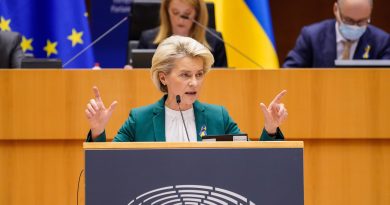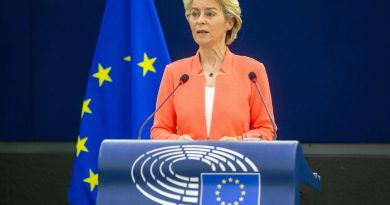The Dutch stand with Ukraine amidst Russia’s war.
The Dutch government and its citizens rally behind Ukraine, of ering political, economic, military and humanitarian support and condemning Russia’s invasion.
When the Russian Federation (RF) invaded Ukraine on February 24th of 2022, under the guise of a special military operation to denazify and demilitarize the country, the Netherlands was quick to condemn the actions of the RF, calling the aggression “unacceptable”. The Dutch government’s official website outlined their planned response, including “a massive package of EU sanctions” on which EU states had to reach a consensus. They also provided humanitarian, economic and military support to Ukraine. The Netherlands planned to work together with other member states of NATO,
the EU and the Organization for Security and Cooperation in Europe (OSCE) with an emphasis on diplomacy, dialogue, and de-escalation.
A 2022 publication by The Conference Board outlines the civilian response by the Dutch people, where they brought to fruition the promises of the government. The Dutch organized mass protests in the months following the start of the war, with thousands of people gathering across the country to voice their support for Ukraine. They gathered money through fundraising benefit events to donate to charities committed to supporting Ukraine. Donation points opened in almost every city throughout the country, where supplies were collected to later be delivered to Ukraine. As of May 24th, over sixty thousand refugees have registered in the country, many of which were hosted by Dutch families who opened their homes to people from all walks of life. As these events unfold, they bring to mind the 2014 crash of Malaysian Airlines flight MH-17 from Amsterdam to Kuala Lumpur, which was shot down by a Russian anti-aircraft Buk missile and crashed in the Donbas region of Ukraine, killing all passengers, the majority of whom were Dutch nationals.
The connection between the two events is often missing in political discourse, with Dutch politicians explaining the
reluctance to sanction Russia in 2014 as naivete, stemming from the belief that maintaining good relations with Russia would improve the country’s attitude to the West. They were also reluctant to inadvertently instrumentalize the pain of the victims to further a political agenda, a sentiment against which the loved ones of the victims have ardently pushed back, emphasizing instead the importance of making connections between the events as parts of the same continuing war.
In the past, the Dutch have shown a reluctance to expand the EU, in part due to a mistrust toward Eastern countries which are perceived to have corrupt political systems. They voted against the Ukraine – EU association agreement in 2016 and in March of 2022 they blocked the fast tracking of Ukraine’s EU membership process, for fear of further provoking Russian President Vladimir Putin.
As of now, the Dutch do not acutely fear for their physical safety, instead raising concerns of potential future cyber attacks and the energy deficit that may be caused by the Russian gas supply being halted. The Netherlands gets 20% of its gas from Russia, but they are seeking alternative sources, including asking citizens to reduce their heating in the winter and continuing gas drilling in Groningen, which they had previously planned to shut down in response to the risks it poses for
earthquakes. The influx of refugees has slowed but those currently residing in the country continue to be supported by the government and its citizens.



